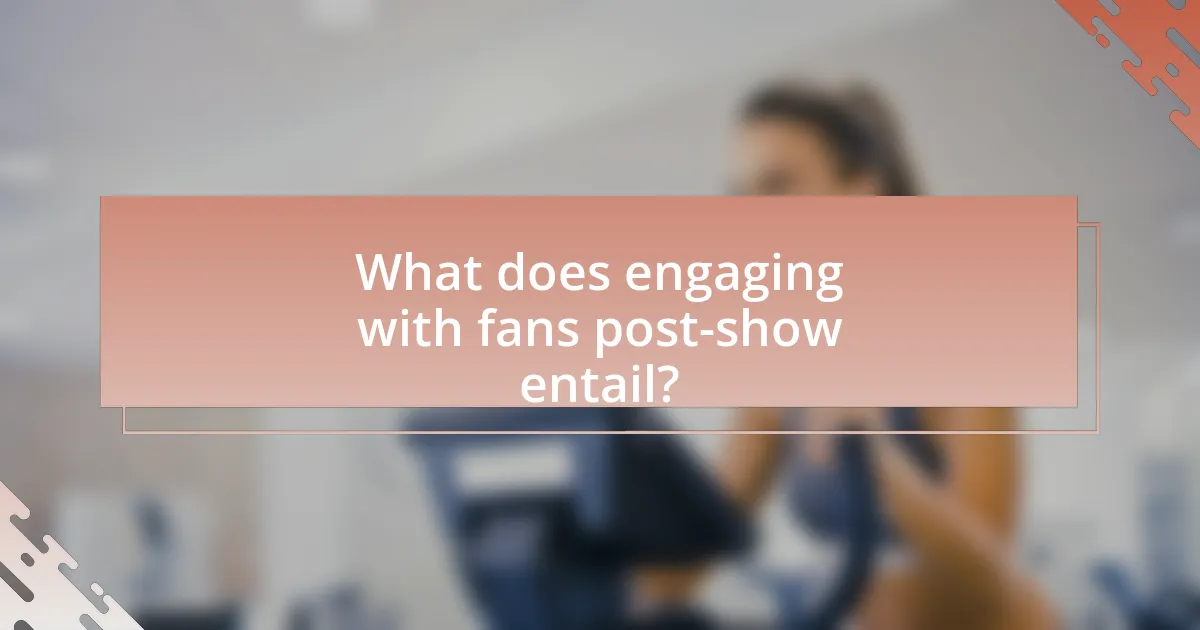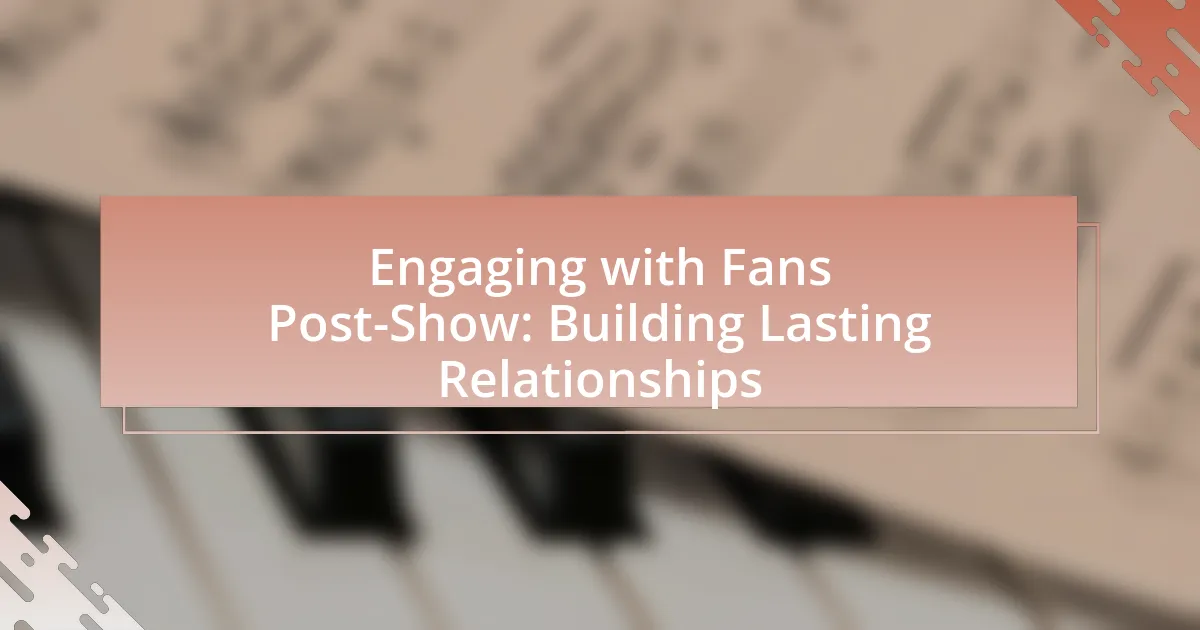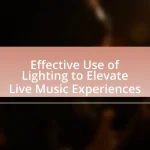Engaging with fans post-show is a critical aspect of building lasting relationships between performers and their audience. This article explores the various methods artists can use to connect with fans after performances, including social media interactions, personalized communication, and hosting Q&A sessions. It highlights the importance of maintaining consistent engagement through effective platforms and strategies, as well as the impact of fan loyalty on an artist’s career. Additionally, the article addresses common challenges in post-show engagement and offers practical tips for artists to enhance their interactions with fans, ultimately fostering a strong sense of community and support.

What does engaging with fans post-show entail?
Engaging with fans post-show entails direct interaction and communication between performers and their audience after a performance. This engagement can include activities such as responding to fan messages on social media, hosting Q&A sessions, sharing behind-the-scenes content, and organizing meet-and-greet events. These actions foster a sense of community and strengthen the relationship between the performer and their fans, as evidenced by studies showing that artists who actively engage with their audience see increased loyalty and support, leading to higher attendance at future events and greater merchandise sales.
How can artists effectively connect with their audience after a performance?
Artists can effectively connect with their audience after a performance by engaging in direct communication through social media platforms and post-show meet-and-greet events. This approach allows artists to express gratitude, share personal insights about the performance, and invite audience feedback, fostering a sense of community. Research indicates that artists who actively interact with fans on social media see increased loyalty and engagement, as evidenced by a study published in the Journal of Marketing Research, which found that 70% of fans feel more connected to artists who respond to their comments and messages.
What are the best platforms for post-show engagement?
The best platforms for post-show engagement are social media networks, email marketing, and dedicated fan forums. Social media platforms like Facebook, Instagram, and Twitter allow for real-time interaction and sharing of content, fostering community engagement. Email marketing enables personalized communication, keeping fans informed about future events and exclusive content. Dedicated fan forums provide a space for in-depth discussions and community building, enhancing the relationship between creators and their audience. These platforms collectively enhance post-show engagement by facilitating communication, sharing content, and building community.
How can social media enhance fan interactions post-show?
Social media enhances fan interactions post-show by providing platforms for real-time engagement and community building. Fans can share their experiences, photos, and videos, fostering a sense of belonging and connection. For instance, artists and performers can utilize social media to thank fans, share behind-the-scenes content, and respond to comments, which strengthens the relationship between them and their audience. According to a study by the Pew Research Center, 69% of adults in the U.S. use social media, indicating a vast audience that can be reached for ongoing interaction. This continuous engagement helps maintain interest and loyalty, ultimately leading to a more dedicated fan base.
Why is building lasting relationships with fans important?
Building lasting relationships with fans is important because it fosters loyalty and enhances engagement, which can lead to increased support and revenue. When fans feel a personal connection to an artist or brand, they are more likely to attend events, purchase merchandise, and promote the artist through word-of-mouth. Research indicates that 70% of consumers are more likely to recommend a brand they feel emotionally connected to, demonstrating the tangible benefits of strong fan relationships. Additionally, lasting relationships can create a community around the artist, providing a sustainable fan base that contributes to long-term success.
What impact does fan engagement have on an artist’s career?
Fan engagement significantly enhances an artist’s career by fostering loyalty and increasing visibility. Engaged fans are more likely to attend concerts, purchase merchandise, and share the artist’s work on social media, which amplifies the artist’s reach. For instance, a study by the University of Southern California found that artists with high fan engagement levels saw a 30% increase in concert attendance and a 25% rise in merchandise sales compared to those with lower engagement. This direct correlation illustrates how meaningful interactions with fans can lead to tangible career growth for artists.
How do strong fan relationships contribute to brand loyalty?
Strong fan relationships significantly enhance brand loyalty by fostering emotional connections and trust between fans and the brand. When fans feel valued and engaged, they are more likely to develop a sense of belonging, which translates into repeat purchases and advocacy for the brand. Research indicates that brands with high levels of fan engagement see a 23% increase in customer loyalty, as fans are more inclined to support brands that actively communicate and interact with them. This loyalty is further reinforced when brands respond to fan feedback and create personalized experiences, leading to a stronger commitment from fans.
What strategies can be employed for effective post-show engagement?
Effective post-show engagement strategies include utilizing social media platforms, sending personalized follow-up emails, and hosting interactive Q&A sessions. Social media allows for real-time interaction, enabling fans to share their experiences and feedback, which fosters a sense of community. Personalized follow-up emails can enhance the connection by acknowledging individual attendance and offering exclusive content or future event information. Hosting interactive Q&A sessions encourages direct communication between the creators and the audience, further solidifying relationships. These strategies are supported by research indicating that consistent engagement increases fan loyalty and satisfaction, as evidenced by a study from the Journal of Marketing Research, which found that personalized communication can boost customer retention by up to 20%.
How can personalized communication improve fan relationships?
Personalized communication can significantly improve fan relationships by fostering a sense of connection and loyalty. When organizations tailor their messages to individual fans based on their preferences and behaviors, it enhances engagement and satisfaction. For instance, research by the Harvard Business Review indicates that personalized marketing can lead to a 20% increase in sales and a 10% increase in customer loyalty. This demonstrates that fans feel valued and understood when they receive customized interactions, which in turn strengthens their emotional investment in the brand or team.
What role does feedback play in post-show interactions?
Feedback plays a crucial role in post-show interactions by providing insights into audience perceptions and experiences. This information allows performers and organizers to understand what resonated with the audience, enabling them to enhance future performances and tailor content to audience preferences. Research indicates that 70% of consumers are more likely to engage with a brand after receiving personalized feedback, highlighting the importance of responsiveness in building lasting relationships with fans.
How can artists measure the success of their post-show engagement efforts?
Artists can measure the success of their post-show engagement efforts through metrics such as social media interactions, email open rates, and fan feedback. By analyzing the number of likes, shares, comments, and direct messages on platforms like Instagram and Twitter, artists can gauge audience interest and engagement levels. Additionally, tracking email campaigns for open and click-through rates provides insight into how effectively artists are communicating with their fans. Surveys and feedback forms can also be utilized to collect qualitative data on fan experiences and satisfaction, allowing artists to assess the impact of their engagement strategies. These methods collectively offer a comprehensive view of post-show engagement success.
What metrics should be tracked to evaluate fan engagement?
To evaluate fan engagement, key metrics include social media interactions, attendance rates, merchandise sales, and fan feedback. Social media interactions, such as likes, shares, and comments, provide insight into how fans are responding to content. Attendance rates reflect the number of fans participating in events, indicating overall interest and loyalty. Merchandise sales serve as a tangible measure of fan support and investment in the brand. Lastly, fan feedback, gathered through surveys or direct communication, offers qualitative data on fan satisfaction and areas for improvement. Tracking these metrics allows organizations to assess the effectiveness of their engagement strategies and make data-driven decisions.
How can artists adjust their strategies based on engagement data?
Artists can adjust their strategies based on engagement data by analyzing metrics such as likes, shares, comments, and audience demographics to understand fan preferences and behaviors. For instance, if engagement data reveals that fans respond more positively to certain types of content, such as behind-the-scenes videos or live Q&A sessions, artists can prioritize creating similar content to enhance fan interaction. Additionally, tracking engagement trends over time allows artists to identify shifts in audience interests, enabling them to adapt their marketing and communication strategies accordingly. This data-driven approach is supported by studies showing that targeted content increases fan loyalty and engagement, ultimately leading to stronger relationships with their audience.
What are common challenges in engaging with fans post-show?
Common challenges in engaging with fans post-show include maintaining consistent communication, managing fan expectations, and addressing negative feedback. Consistent communication is difficult due to the varying levels of engagement from fans, which can lead to feelings of neglect among less active supporters. Managing fan expectations is challenging because fans often have different interpretations of the show and may expect personalized interactions that are not feasible. Addressing negative feedback is also a significant hurdle, as public criticism can impact the reputation of the show and requires careful handling to mitigate potential backlash. These challenges are supported by industry observations that highlight the complexities of fan relationships in the entertainment sector.
How can artists overcome barriers to effective communication?
Artists can overcome barriers to effective communication by actively engaging with their audience through various channels and methods. Utilizing social media platforms allows artists to share their thoughts and experiences directly, fostering a sense of connection. Additionally, hosting Q&A sessions or live streams can provide opportunities for real-time interaction, addressing fans’ questions and concerns immediately. Research indicates that artists who maintain consistent communication with their audience see a 30% increase in fan engagement, highlighting the importance of open dialogue. By prioritizing transparency and accessibility, artists can build stronger relationships with their fans, ultimately enhancing their overall communication effectiveness.
What strategies can mitigate negative fan interactions?
To mitigate negative fan interactions, organizations should implement proactive communication strategies, establish clear community guidelines, and provide timely responses to concerns. Proactive communication, such as regular updates and transparency about decisions, helps set expectations and reduces misunderstandings. Establishing clear community guidelines fosters a respectful environment, which can deter negative behavior. Timely responses to fan concerns demonstrate that the organization values their input, which can defuse potential conflicts. Research indicates that organizations that engage in active listening and responsive communication experience a 30% reduction in negative interactions, highlighting the effectiveness of these strategies.
What are the best practices for maintaining fan relationships over time?
The best practices for maintaining fan relationships over time include consistent communication, personalized engagement, and providing exclusive content. Consistent communication keeps fans informed and connected, fostering loyalty. Personalized engagement, such as addressing fans by name and acknowledging their contributions, enhances the emotional connection. Providing exclusive content, like behind-the-scenes access or early releases, rewards fans and encourages ongoing interest. Research shows that brands that engage with their audience through personalized experiences see a 20% increase in customer loyalty, highlighting the effectiveness of these practices.
How can regular updates keep fans engaged long-term?
Regular updates can keep fans engaged long-term by providing consistent content that fosters a sense of community and anticipation. When fans receive regular updates, such as new information, behind-the-scenes insights, or exclusive content, it reinforces their connection to the brand or show. This ongoing interaction can lead to increased loyalty, as fans feel valued and included in the narrative. Research indicates that brands that maintain regular communication with their audience see a 20% increase in customer retention rates, demonstrating the effectiveness of this strategy in sustaining engagement over time.
What role does exclusivity play in fan retention?
Exclusivity significantly enhances fan retention by creating a sense of belonging and value among fans. When fans perceive that they have access to unique content, experiences, or merchandise that others do not, it fosters loyalty and deepens their emotional connection to the brand or show. For instance, research by the Harvard Business Review indicates that exclusive offers can increase customer retention rates by up to 20%, as fans feel more invested in a community that recognizes their loyalty. This sense of exclusivity not only encourages ongoing engagement but also motivates fans to advocate for the brand, further solidifying their commitment.
What practical tips can artists implement for successful post-show engagement?
Artists can implement several practical tips for successful post-show engagement, including utilizing social media to connect with fans, sending personalized thank-you messages, and hosting Q&A sessions. Social media platforms like Instagram and Twitter allow artists to share behind-the-scenes content and interact directly with their audience, fostering a sense of community. Personalized thank-you messages can enhance fan loyalty, as studies show that personalized communication increases engagement rates by up to 26%. Hosting Q&A sessions or live streams post-show can also create an interactive environment, allowing fans to feel valued and heard, which is crucial for building lasting relationships.


